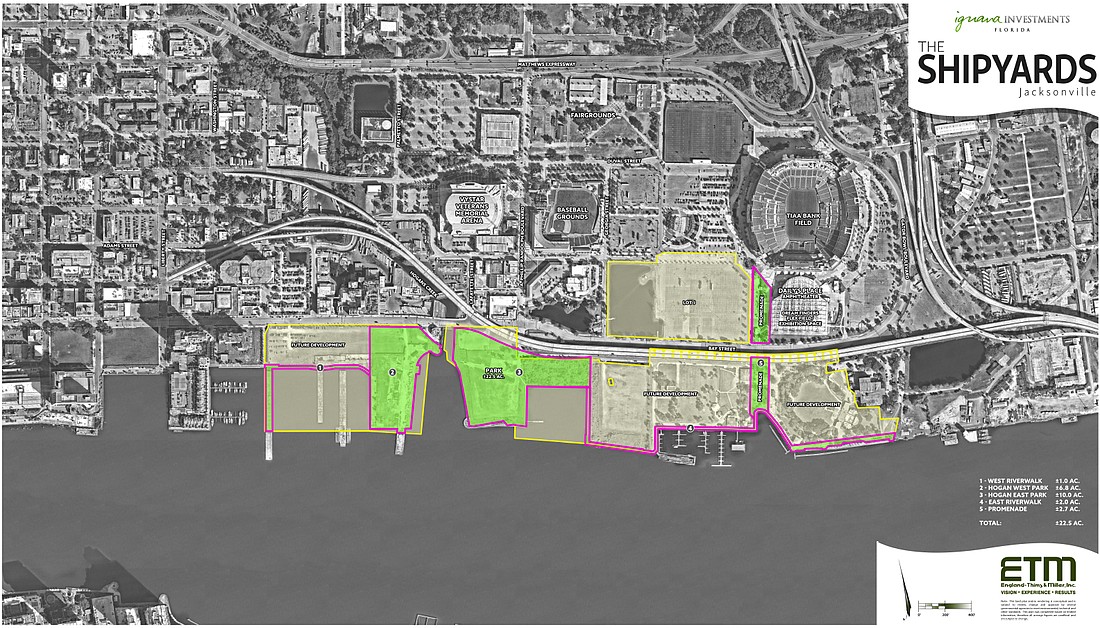
Mayor Lenny Curry’s administration will withdraw a bill that refunds $1.725 million in federal grant funding instead of finding a replacement for Metropolitan Park Downtown.
The move comes weeks after a development company owned by Jacksonville Jaguars owner Shad Khan released a plan that incorporates the park into its mixed-use Shipyards development.
City Council member Matt Carlucci said Aug. 10 that Ordinance 2019-555 will be withdrawn at the Council Finance Committee’s Aug. 18 meeting.
City officials wanted to return the unused National Park Service grant money it received in 1981 through the Florida Department of Environmental Protection.
Curry administration officials hoped that would satisfy the city’s contractual requirements in the grant so the park at 1410 Gator Bowl Blvd. could be redeveloped as part of Khan’s proposed Shipyards project near TIAA Bank Field.
The bill has been continuously deferred at Curry’s request since then-Council President Scott Wilson introduced it in August 2019.
A spokesperson for Khan’s development company, Iguana Investments Florida LLC, said in an email Aug. 10 the decision to kill the bill will not affect the development timeline for the Shipyards.
“The revitalization of Downtown Jacksonville remains one of our top priorities. As such, we are fully committed to the Lot J and Shipyards projects,” the spokesperson said. “The withdrawal of this bill does not impact our Shipyards development timeline.”
The future Shipyards site is adjacent to Khan’s proposed $700 million, two-phase residential, hotel, commercial office and entertainment development at Lot J. That is being developed by partners The Cordish Companies and Jaguars subsidiary Gecko Investments LLC operating as Jacksonville I-C Parcel One Holding Company LLC.
The city has been unsuccessfully negotiating with the National Park Service since 2017 over the Metropolitan Park boundaries and a potential comparable replacement site, according to a bill summary.
The grant money was originally intended for improvements for St. Johns River Esplanade, a public promenade on the riverfront adjacent to the then-Civic Auditorium, now the Times-Union Center for the Performing Arts.
When that project did not happen, the city requested the grant money be shifted to buy riverfront property near Commodore’s Point now known as Metropolitan Park.
The 1981 grant agreement with the then-named Florida Department of Natural Resources required the city to reserve the property for public recreational use to get the grant award.
If the city wants to sell the land for private development, the state and National Park Service require a like-size replacement property.
The Curry administration did not provide the Daily Record answers to questions about the bill sent via email as of the evening of Aug. 10.
Carlucci said Curry administration officials told him Aug. 10 that the issue could be revisited in one to two years, but nothing is definite.
Carlucci said he supports the withdrawal of the bill and wants more public input on the park’s future and all city-owned Downtown riverfront property.
“That park, when that deal was put together, was to ensure that Jacksonville was to have a riverfront park in perpetuity, “ Carlucci said. “It was a pledge that was to not be broken.”
Now part of the Shipyards?
The withdrawal comes more than a month after a lawyer for Iguana Investments told the Council Finance committee that his client would consider integrating Metropolitan Park into the Shipyards design.
Attorney Paul Harden gave a presentation to the committee July 21 and provided Council with a proposed site plan that he said in a June 29 letter replaces Metropolitan Park within the Shipyards development “acre for acre.”
A map with Harden and Iguana’s filing shows the 22.1-acre park shifting west of A. Philip Randolph Blvd., split into two sections by the St. Johns River.
Harden said the following his letter to Council:
“While Iguana has been working on Lot J plans over the last few months, we have spent a great deal of time and effort to design a plan for the shipyards. The shipyards plan is focused on substantial open space.
“As you can see, it replaces acre for acre the Metropolitan Park site on the shipyards area. I think it is even more fair to say that Metropolitan Park is not replaced, but rearranged. The park lands will be open and accessible to the public and will be integrated with other development in the area.
“ It will be updated from the 80s design to provide riverfront access and maximize the usable space. After the redesign, the citizens of Jacksonville will not only have the same amount of park space on the shipyards as in the Metropolitan Park location current but also an equal amount off-site for public use on the waterfront.
“The considered off-site locations are discussed briefly in the (Florida) Times-Union article. After the new design is implemented on the shipyards area, there will be 24-hour a day access to the public on the entire site. Iguana’s vision is a combined development and parkland scenario comparable to any great city in this country.”
Harden’s letter referenced a June 26 Times-Union story about emails that showed city attorneys identified a property on Black Hammock Island in northeast Jacksonville and a 30-acre park that’s part of $600 million Downtown’s Southbank development The District as replacements for Metropolitan Park. The Times-Union reported properties near Arlington’s Reddie Point and Fort Caroline’s Greenfield were also considered as potential replacements.
Harden told the Finance Committee that Iguana is “a bystander” in the negotiations, but he’s aware that the city appraised five to six parcels throughout the city for a possible land swap.
Carlucci invited Jaguars President Mark Lamping and Harden to speak about the bill during the Aug. 18 Finance Committee meeting, but because of its withdrawal it is unclear if the hearing will take place.